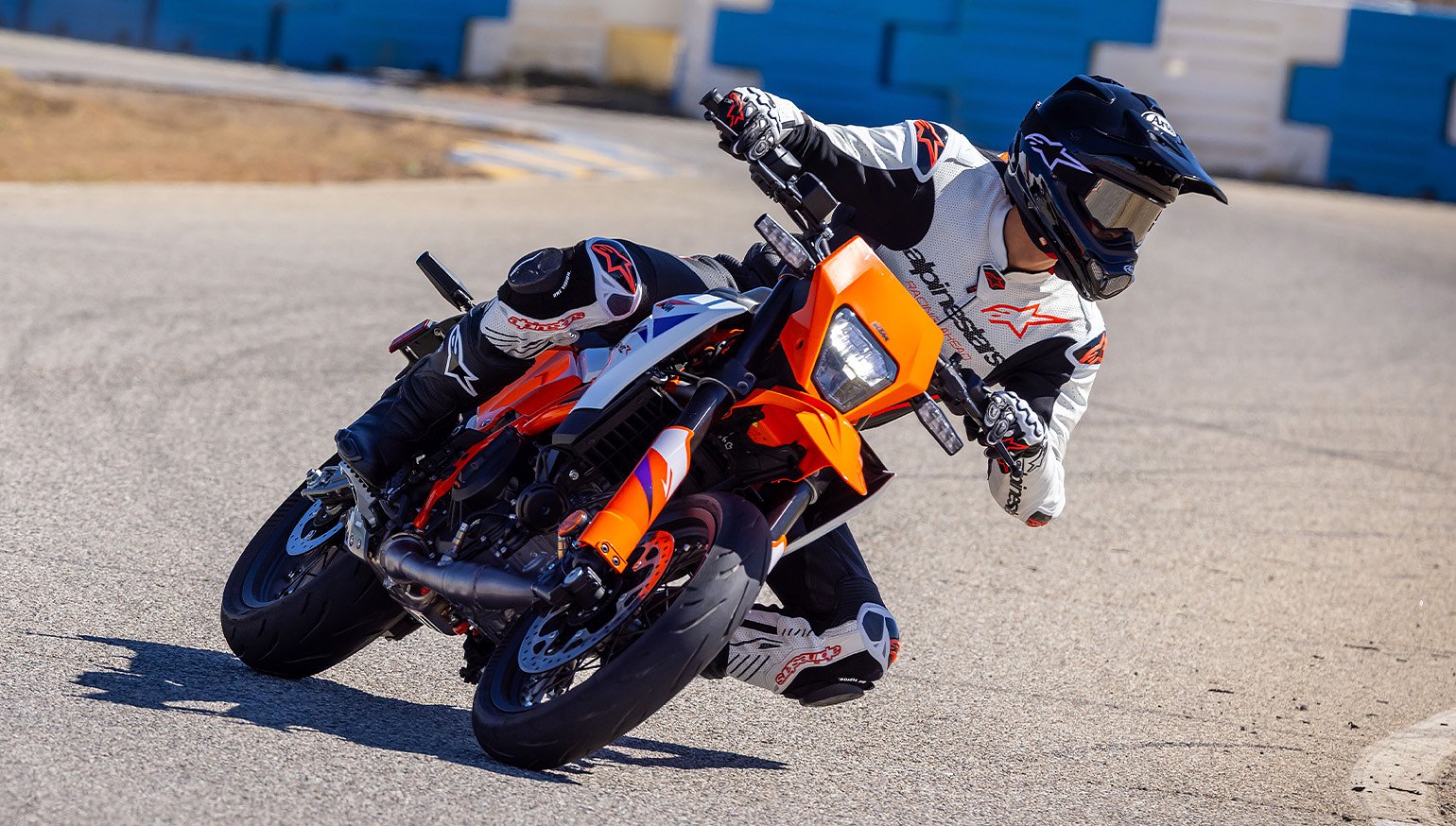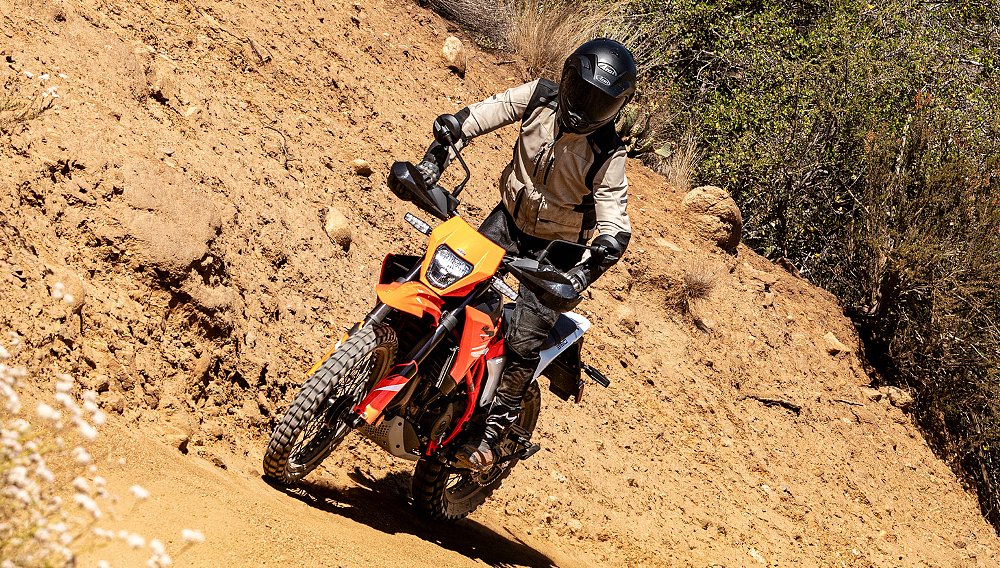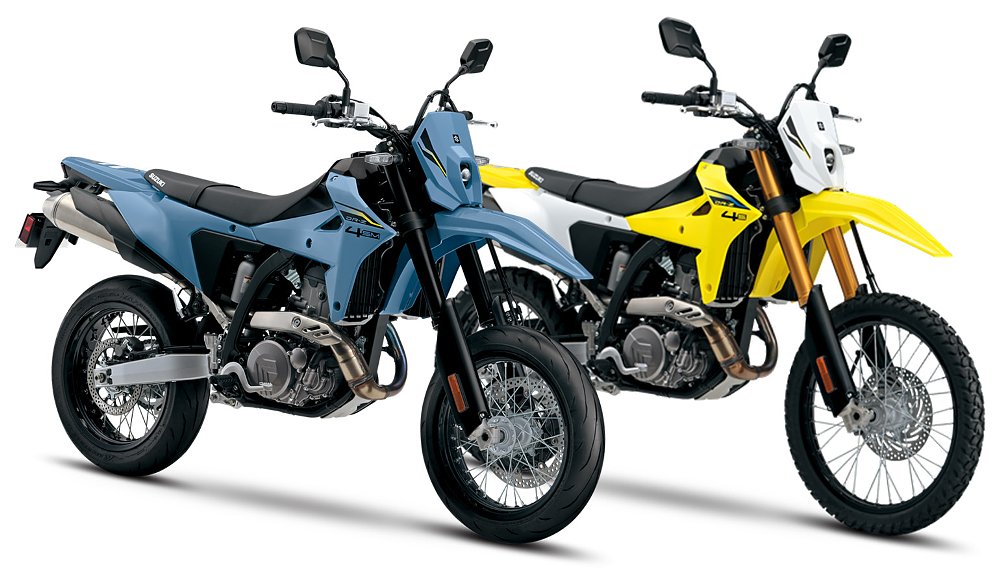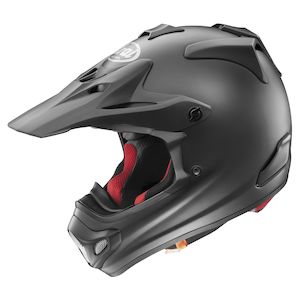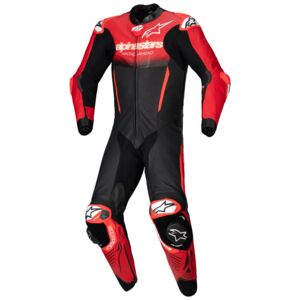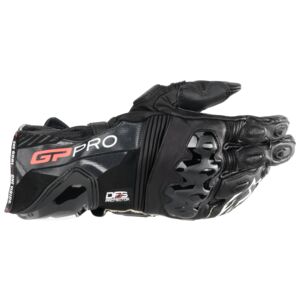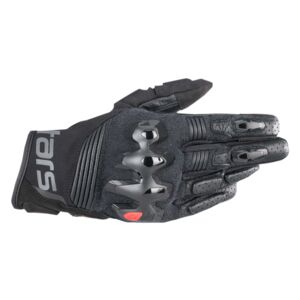Supermoto is dead.
At least, that was the narrative five years ago. It wasn’t always that way, though.
From the mid- to late-2000s, supermoto was on the tip of everyone’s tongues. Manufacturers seized the moment by rolling out street-going machines. From Europe came the KTM 950 SM, KTM 690 SM, and BMW-built Husqvarna SM 610. At the other end of the pricing and performance spectrum were the Japanese-made Yamaha WR250X, Kawasaki KLX250SF, and Suzuki DR-Z400SM. It was undeniable, supermoto had peaked in popularity, but the segment whittled away with each passing year.
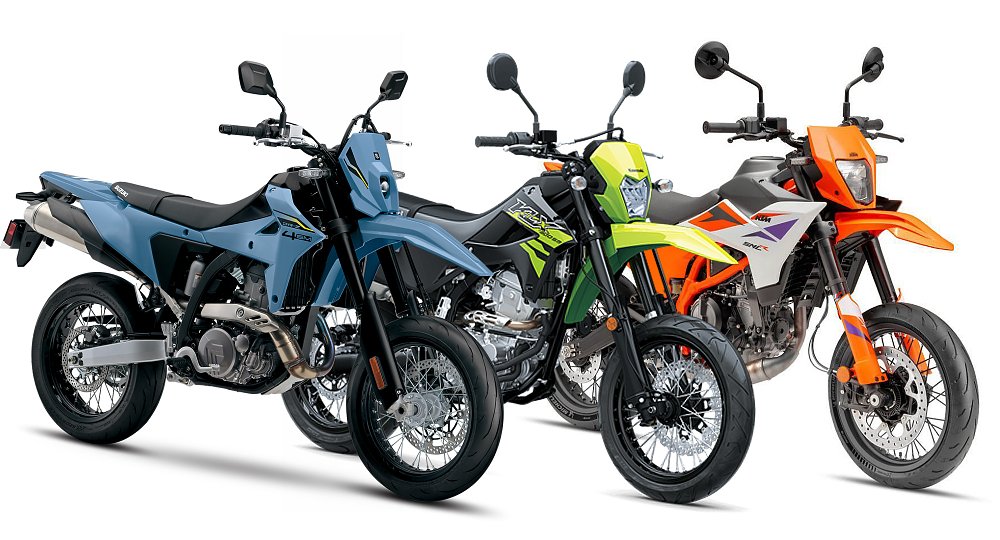
By 2020, the only road-homologated SMs were KTM’s 690 SMC R (and its Husky derivative), Ducati’s Hypermotard 950, and Suzuki’s antiquated DR-Z400SM. Little did we know a category revival was in order. Kawasaki kicked off the comeback with the KLX300SM in 2021. The beginner-friendly KLX230SM followed just two years later. Ducati then added the Hypermotard 698 Mono to its stable in 2024. Even Suzuki joined in, refreshing and renaming the DR-Z400SM as the DR-Z4SM in 2025.
Supermoto is, indeed, alive and well. The arrival of the 2025 KTM 390 SMC R only affirms that. Still, the wee SMC has its work cut out for it. With the class more crowded than years past, can this 390 stand above its rivals? Answering that question sent me to Murrieta, California, where the KTM hosted the model’s North American press launch.
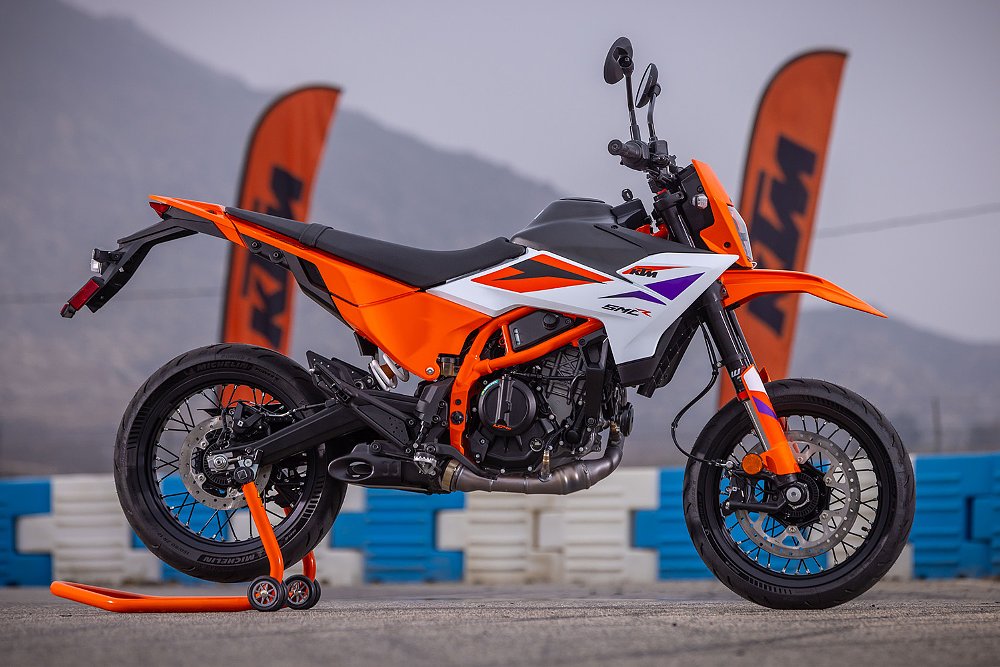
Family resemblance
If the 390 SMC R looks familiar, it’s for a good reason. KTM’s latest SuMo is the sixth member of the 390 family, which also includes the 390 Duke, RC 390, 390 Adventure X, 390 Adventure R, and 390 Enduro R. Like most siblings, the SMC R is forced to share with its relatives. Its engine, for instance, spans the entire 390 lineup.
KTM updated its LC4c single just last year. The mill remains mechanically identical in the 390 SMC R. That means its bore and stroke still measure 89 mm and 64 mm (respectively), totaling 399 cc of displacement. The Austrians also maintain a claimed output of 44.3 horsepower (at 8,500 rpm) and 28.8 foot-pounds of torque (at 7,000 rpm). No surprises there, be it good ones nor bad ones. The frame in which that engine rests plays it nearly as safe.
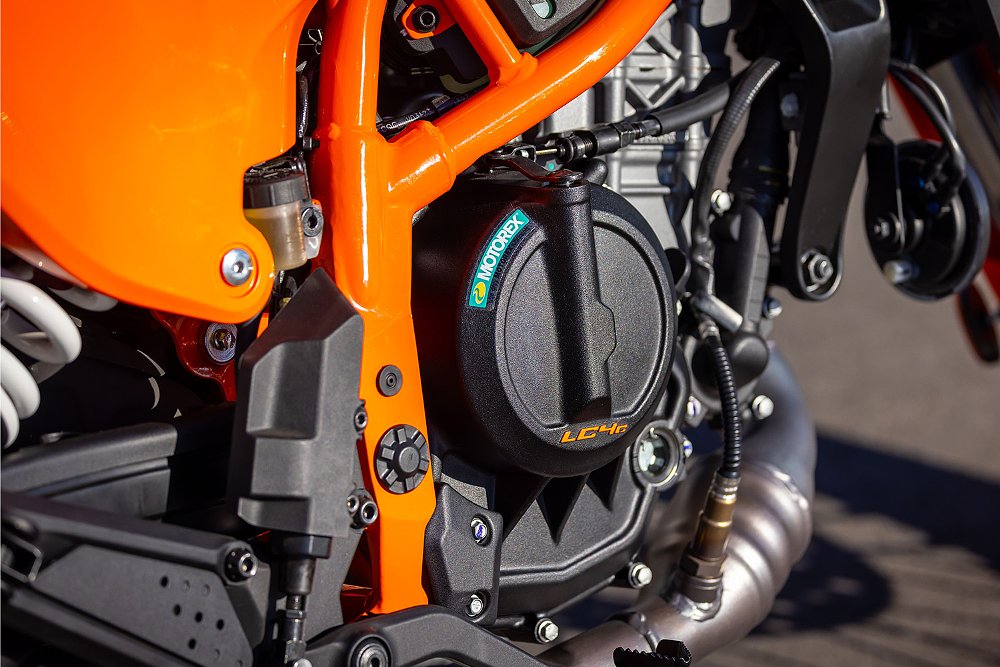
The 390 SMC R shares much with the 390 Enduro R. The dirt-hungry dual-sport features a modified version of the 390 Duke’s frame. So does the SMC. The Enduro rocks WP Apex suspension. So does the SMC. It benefits from nine inches of travel at both ends. So does the SMC. You get the point, the supermoto has a lot in common with its trail-hunting kin. Where the former differs comes down to a very select set of components.
A 43 mm USD fork and split-piston shock suspend both the Enduro and SMC, but WP tuned the SuMo’s suspension for life on the asphalt. It’s the same reason KTM turned to the 320 mm front rotor found on every 390 model except the Enduro R. Of course, it isn’t a supermoto without a 17-inch wheelset. The 390 SMC R not only rides on such wheels, they come wrapped in Michelin’s sporty Power 6 tires. Color me impressed, especially when taking the model's $5,499 MSRP into account.
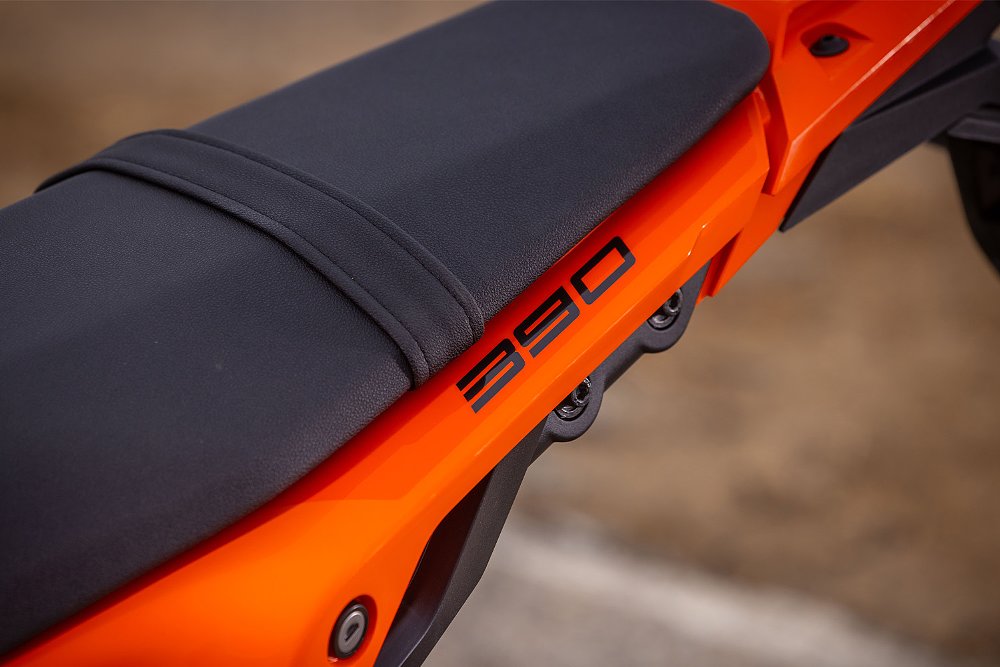
The wheel swap not only reduces the model’s rake to 26.9 degrees (from 27.1 degrees), but it also shrinks the wheelbase to 57.2 inches (from 58.1 inches). The electronics follow that example, applying only the necessary changes to the Enduro R’s proven package. Its still has two ride modes (Street and Sport), with ABS settings (standard, Supermoto, and Supermoto+) and multi-level traction control (Street, Sport, and disabled) available to the user.
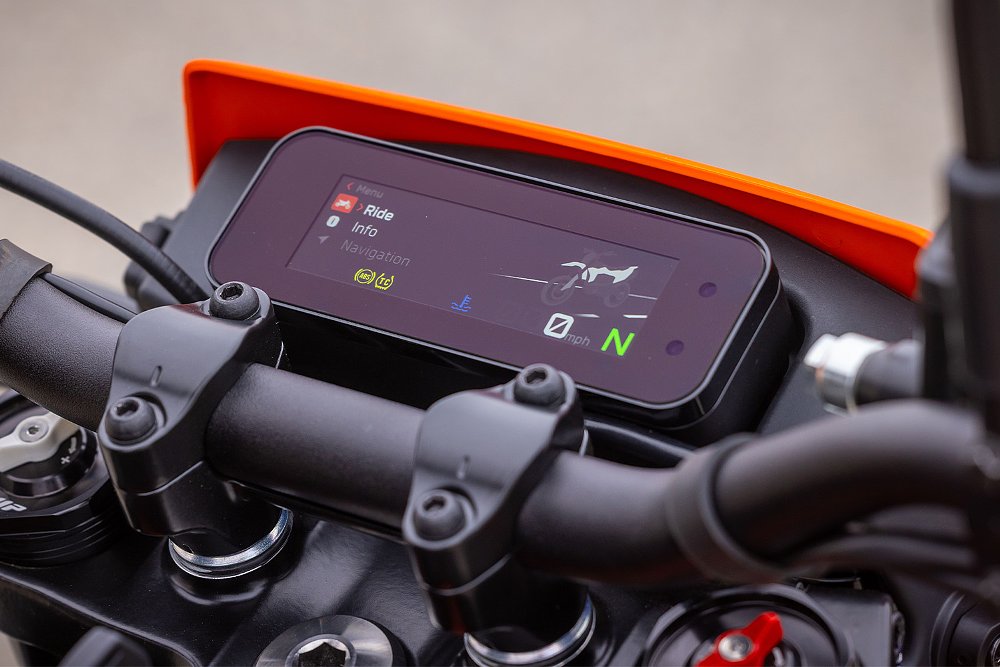
The differences between the SMC R and Enduro R are minor, but the results are major. At the same time, KTM’s concerns rest with customers confusing the 390 for a race-prepped supermoto. It. Is. Not. That much was clear during the part-street, part-track test ride.
Keeping track
“It’s not a 450 SMR,” KTM North America Product Manager Ryan Sarancha warned our group.
It’s an important caveat to deliver. So important that Sarancha stated it before speaking a lick about the 390 SMC R. KTM’s 450 SMR is a competition-only machine. It’s born and bred on the race track. The opposite is true of the 390 SMC, which is a street bike through and through. That doesn’t mean the road-prepped supermoto can’t turn a few laps on the kart track, though. To prove as much, KTM ushered our group to the Apex Motorsports Park in nearby Perris, California.
If you don’t obsess over lap times, if tire-warmers seem like a pain in your you know what, the 390 SMC R is probably more of your speed. It’s compact, agile, and responsive, cutting through chicanes and wrapping around hairpins in one fluid swoop. The 399 cc thumper belts out enough ponies on the straights, too, with generous over-rev to boot. It’s a competent track bike. That is, as long as you keep your expectations in check.
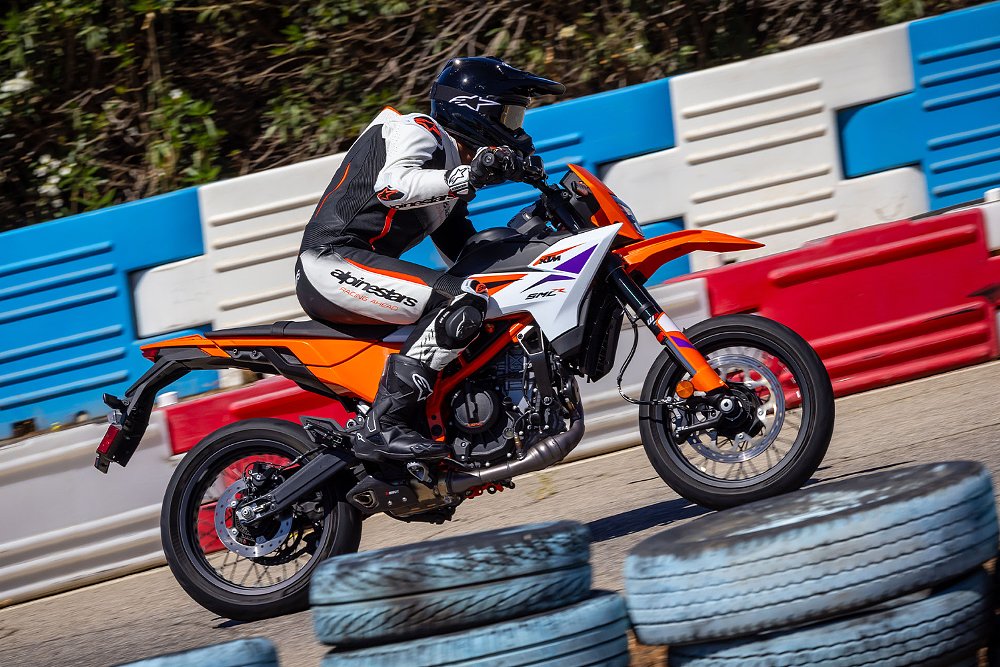
As Sarancha stressed, the 390 SMC is not the 450 SMR. Its brakes deliver adequate stopping force, but don’t expect race-worthy power or feedback. The suspension remains composed under heavy braking, but the shock doesn't handle g-outs well. Plus, the track's dirt section was off limits during our sessions (that speaks volumes, if you ask me). The SMC obviously has its limitations, and many of them rear their heads when the lean angles rise.
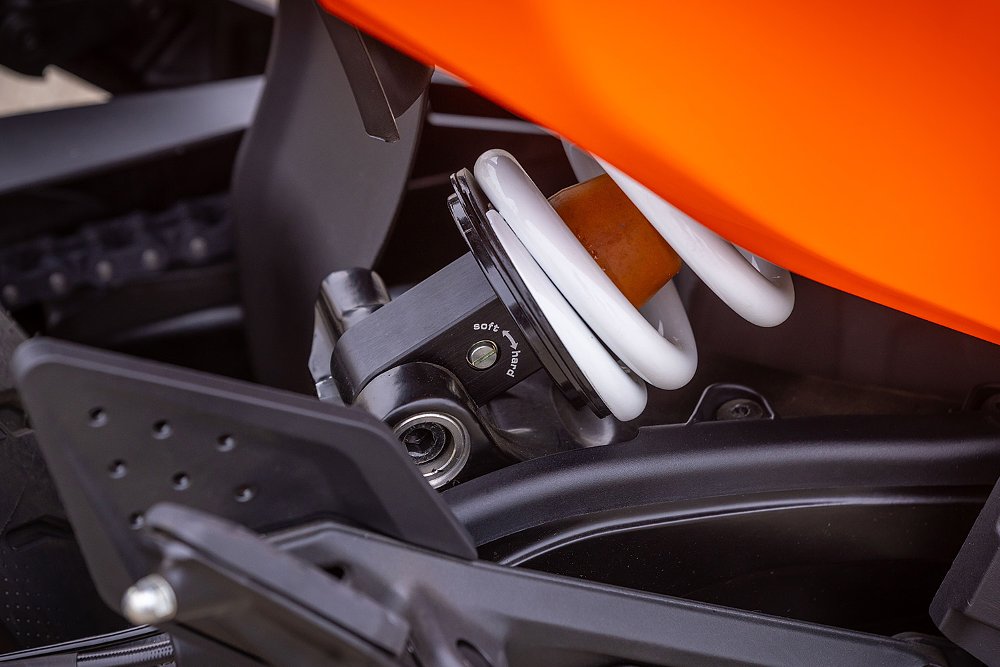
The track surface at Apex is a mixture of old asphalt, tar snakes, and concrete strips. In other words, traction is inconsistent and hard to come by, especially with the SMC fully banked over. The twitching front end at turn 10 and rear-end step out at turn 11 told me as much. I managed the former but Sport traction control helped correct the latter. Both illustrate the model’s limitations. Much of which boils down to the tires.

Unlike race slicks, the Power 6s can’t make grip where there is none. While I attribute the vast majority of my traction woes to the track surface, the Michelins aren’t constructed for chasing tenths. Is the Power 6’s stiff carcass to blame for the lack of “feel”? Possibly. Is its rubber compound too hard for track applications? Most likely. That's why it's worth remembering that the 390's natural habitat is the street.
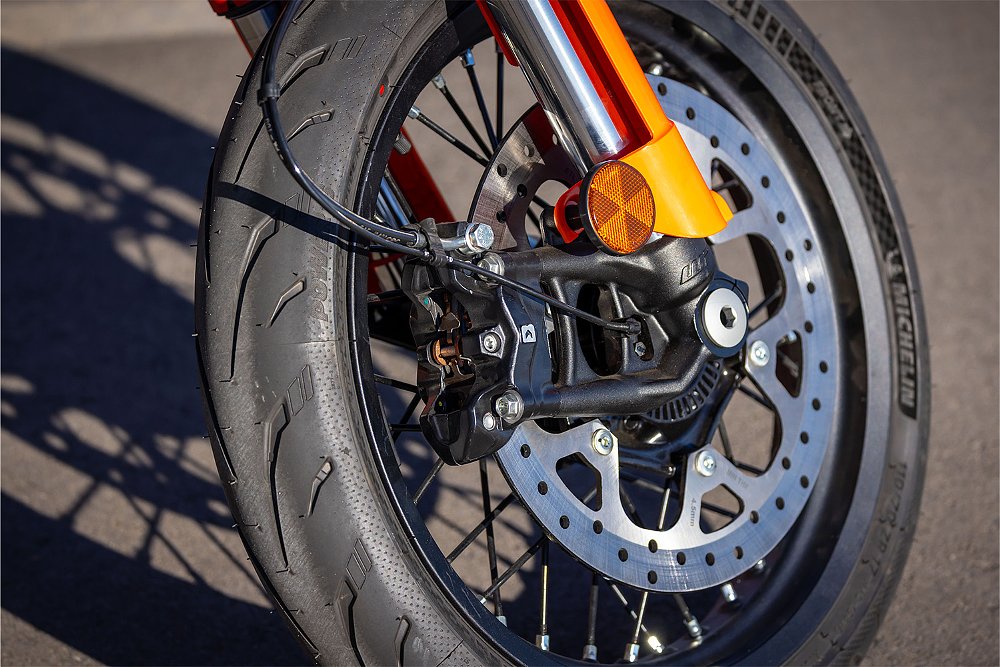
No, the SMC R doesn’t ride on the razor’s edge, but those in the market for one don’t either. What the 390 scores high on is fun factor. It isn’t built to set personal bests or top the podium. Where lap timers, tire warmers, and engine hours are concerned, the SMC wants no part. That doesn’t make it any less fun. In many regards, it makes it more so. That’s because, unlike the 450 SMR, the 390 SMC R can take all that fun to the off-track.
Getting better all the time
“I’ve got to admit it’s getting better, it’s getting better all the time.”
Those Beatles lyrics bounced around my brain as I accelerated away from a light. The 390 SMC R pulled ahead without as much as a wheeze, cough, or choke. That should be expected of all motorcycles, but not all motorcycles house KTM’s latest-gen LC4c engine. It’s an important distinction because much of my 390 Enduro R criticisms centered on that single-cylinder lump. My complaints actually date back to the 2024 Husqvarna Svartpilen/Vitpilen 401. I’m happy to report that I don’t have to repeat that feedback with the 390 SMC R.
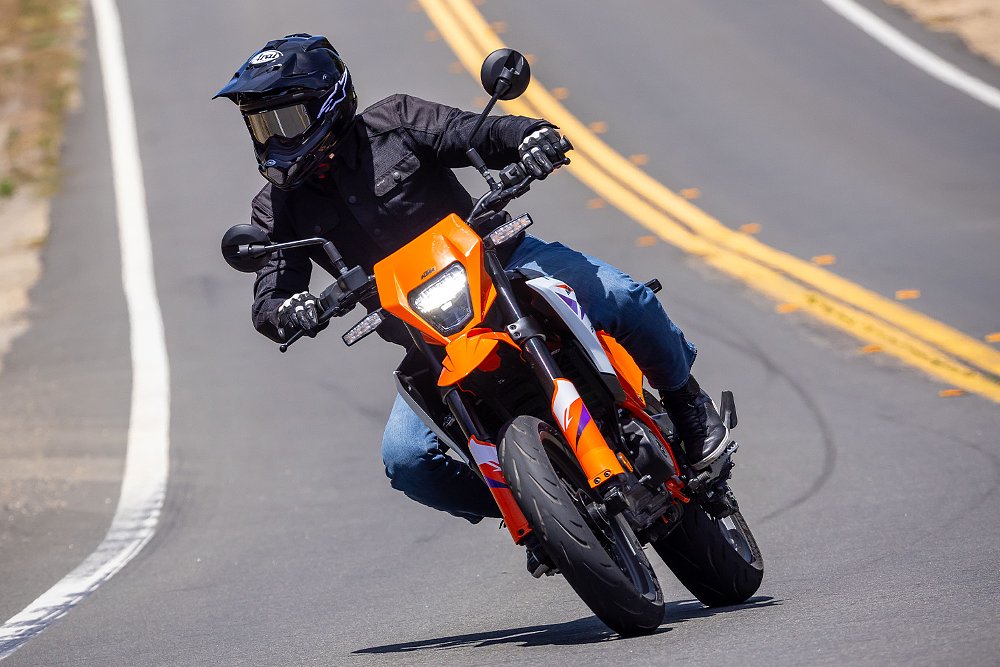
Not once did I experience stalling on the supermoto. That goes for decelerating, cold starting, or simply nursing the clutch, all of which caused the LC4c to sputter out in the past. During my time with the 390 Enduro R, a brand rep disclosed that KTM blamed the Quickshifter+ for the mill’s finicky fueling. They also claimed that an updated quickshifter map would address the issue. If I’m being honest, I was pessimistic. After riding the SMC R, I’m not as skeptical, as KTM uploaded the new map to each test unit.
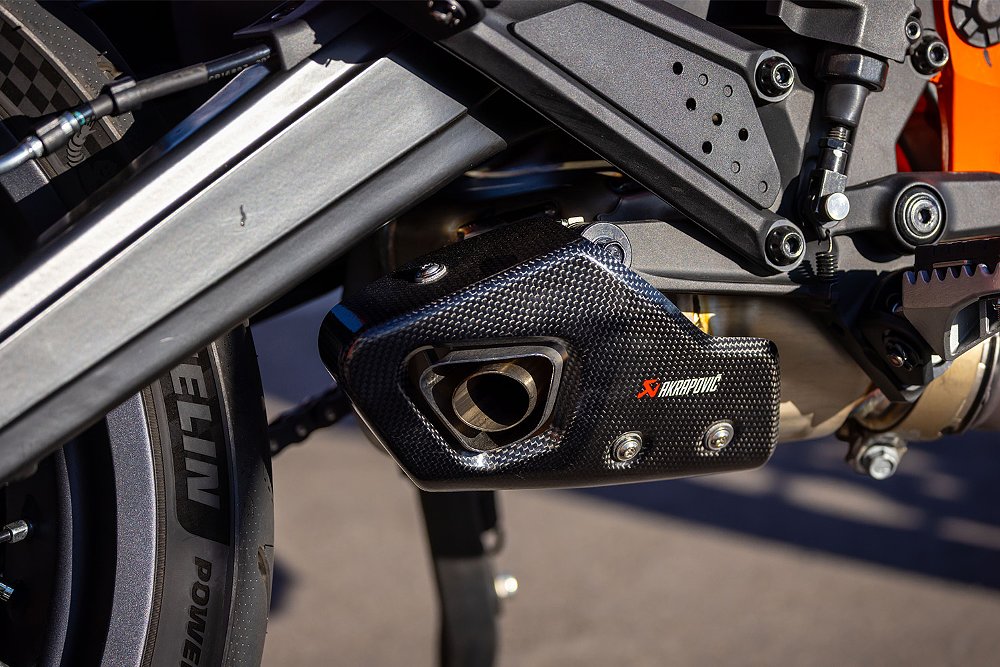
While the Austrian marque seems to have found a cure for the fueling hiccups, another pre-existing problem remains. The kickstand shared between the 390 SMC R, 390 Adventure R, and 390 Enduro R is known to trigger the kill switch when the rider rests their heels on it. The team is troubleshooting a solution as we speak, but I wouldn’t count on an update to arrive in 2025. As of now, what you see is what you get. The question is whether or not that’s enough.
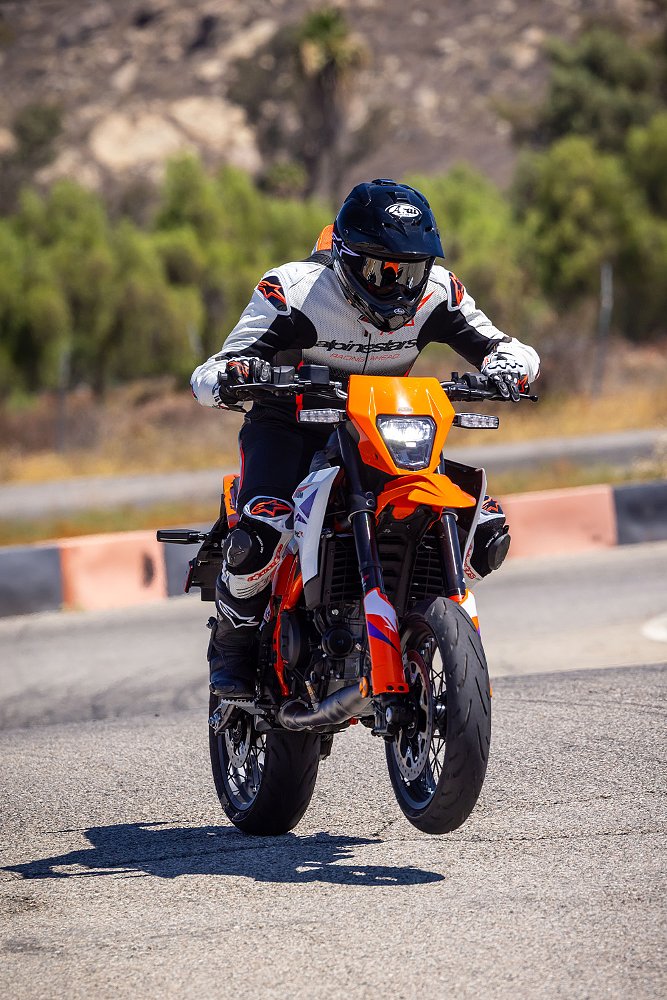
Long live supermoto
Small-capacity, road-legal supermotos aren’t just back, they’re back in force. In one corner, Kawasaki’s KLX300SM courts penny-pinching beginners. The other corner belongs to the heavily revised Suzuki DR-Z4SM — and its $8,999 price tag. KTM’s 390 SMC R lives between those two poles. Its tech specs rival that of the DR-Z yet its price undercuts the KLX. Starting at just $5,499, the SMC arrives in an advantageous position. It still faces an uphill battle, regardless.
The 390 SMC R handles with the best of them. It’s electronics are years ahead of its competitors. Even its fueling is improved now. Despite all that praise, a black cloud still lingers over its maker, KTM. The Mattighofen marque may have avoided bankruptcy, but consumers remain apprehensive. Yes, Team Orange reports that it sold 100,000 motorcycles in the first half of 2025, but that’s still down from years past. The SMC isn’t just battling with rivals, it’s also battling the narratives surrounding KTM. Godspeed, 390. Godspeed.
The fact is that supermoto isn’t dead. Whether the segment is floundering or flourishing, one thing has remained true all these years: KTM hasn’t given up on supermotos. It’s been one of, if not the only, manufacturer to continue producing SMs since their peak in the mid aughts. Supermotos and KTM have endured dark days. What the 390 SMC R represents is new hope, for both the class and the brand. Long live supermoto!
| 2025 KTM 390 SMC R | ||
|---|---|---|
| Price |
$5,774 (as tested)
$5,499 (MSRP)
|
|
| Engine | 399 cc, liquid-cooled, four-valve single | |
|
Transmission, final drive |
Six-speed, chain | |
| Claimed horsepower | 44.3 @ 8,500 rpm | |
| Claimed Torque | 28.8 @ 7,000 rpm | |
| Frame | Tubular steel | |
| Front suspension | WP APEX 43 mm fork, adjustable for compression and rebound damping; 9 inches of travel | |
| Rear suspension | WP APEX shock, adjustable for spring preload and rebound damping; 9 inches of travel | |
| Front brake | ByBre four-piston caliper, 320 mm disc with ABS | |
| Rear brake | ByBre two-piston caliper, 240 mm disc with ABS | |
| Rake | 26.9 degrees | |
| Wheelbase | 57.2 inches | |
| Seat height | 33.9 inches | |
| Fuel capacity | 2.37 gallons | |
| Tires | Michelin Power 6, 110/70R17 front, 150/60R17 rear | |
| Claimed weight | 355 pounds | |
| Available | Now | |
| Warranty | 24 months | |
| More info | KTM.com | |




